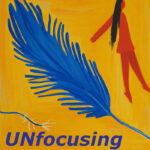
This page features highlights from an introductory class presented by Serge Prengel in 2023. There are 9 video clips for a total of 24 minutes.
To get the most out of this self-coaching, I suggest you take a pause after watching each short video clip.
If you’re watching this with a friend or a small group, take a moment to discuss each video clip.
If you’re watching it on your own, write a short paragraph that summarizes what you got from the clip.
You can first read the introduction below, or directly go to the video clips.
Introduction to Focusing
As Eugene Gendlin was researching the process of psychotherapy, he noticed that the best predictor of a successful outcome was the client’s ability to stop in their tracks for an aha moment. He went on to study this natural process in order to make it possible for people to make more use of it, in therapy as well as in any other context. He came up with the name “Focusing” to describe the process that allows a felt sense to form and progressively come into focus, much as an image comes into focus when you adjust the focus on binoculars.
The process may be called “Focusing”, but a major part of it is to “unfocus” from autopilot mode. It takes a pause to unfocus. When you pause, there is an ever-so-slight sense of surprise (hence the “hmmm” sound you might make). This temporarily unfocused, disoriented mode is needed to activate your natural ability to re-orient, i.e. to focus on what is actually going on right now.
This has to do with the paradox of mindfulness:
– It is totally natural for us to be on automatic pilot (i.e. mindless), in the sense that mindfulness is engaged only when we need it;
– It takes gaming the system to engage mindfulness (the intentional pause, which interrupts the mindless autopilot mode);
– The disruption automatically engages our inner GPS, i.e. the natural way our whole organism takes stock of the environment and adapts to it, most of the time below awareness.
So, think of Focusing as a mindful practice:
– You give yourself an opportunity to shift from mindless autopilot by “unfocusing,” i.e. taking a pause (which can simply be a beat, a brief moment);
– As this pause disorients you, your built-in GPS takes fresh stock of the situation. This is similar to what Zen practitioners call Beginner’s Mind. This is essentially a “right-brain” process, implicit rather than explicit;
– You then engage your “left brain” in making the fuzzy felt sense from the “right brain” progressively more explicit.
Focusing is a natural process. We don’t need to strain to make it happen. It works best when we create a space in which it arises by itself. So, before Focusing can happen, we need to unfocus.
Video clips
Video clip 1: The foundational story (3 min)
How Gene Gendlin discovered Focusing. And why I think of it as an Active Pause.
Video clip 2: About insights and Aha moments (2 min)
Looking at Focusing within the context of insights.
Video clip 3: Tightening & opening-up (2 min)
The physicality of focused awareness and unfocused awareness.
Video clip 4: Hyperfocused vs Unfocusing (2 min)
Why we need both focused and unfocused attention.
Video clip 5: The Inner GPS (4 min)
How our Inner GPS works.
Video clip 6: Feeling lost (1 min)
Why it’s OK to feel lost.
Video clip 7: What happens when we pause (5 min)
The mindful process of letting your body figure it out.
Video clip 8: Staying with the unknown (2 min)
What makes it dificult to sat with the unknown.
Video clip 9: Felt Sense (2 min)
Living with the variety of felt sense experiences.
What next?
See:
– Events & courses for the general public
– Courses for therapists
If you’d like to learn more about Focusing, creative approaches to mindfulness, and related topics, subscribe to the newsletter.